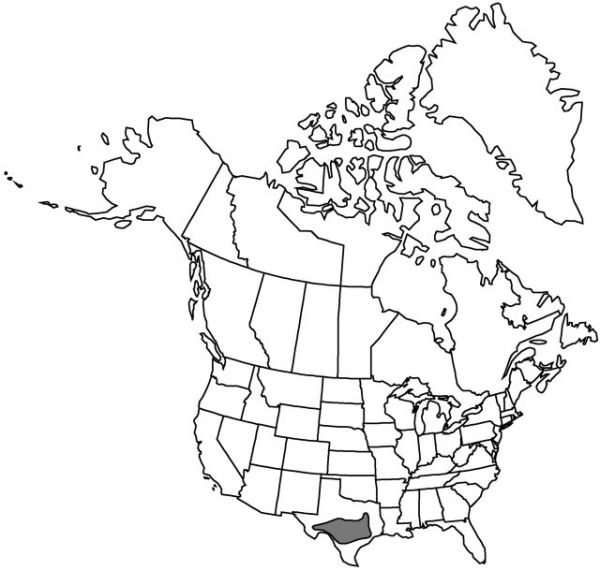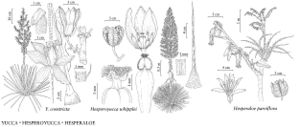Difference between revisions of "Yucca constricta"
Proc. Acad. Nat. Sci. Philadelphia 14: 8. 1863.
FNA>Volume Importer |
FNA>Volume Importer |
(No difference)
| |
Revision as of 19:34, 24 September 2019
Plants forming small to large, open colonies, acaulescent or occasionally caulescent and arborescent; rosettes usually small, asymmetrical. Stems procumbent, to 0.4 m. Leaf blade divergent, spreading, linear or somewhat wider near middle, mostly straight, flattened or plano-convex, 25–65 × (0.3–)0.7–1.5 cm, soft, rigid, margins entire, becoming filiferous, whitish or light green. Inflorescences paniculate, racemose distally, arising 2–4.6 dm beyond rosettes, ovoid, 4.5–13 dm, distance from leaf tips to proximal inflorescence branches more than twice leaf length when fully expanded, glabrous; raceme 20–25 cm; proximal branches 15–25 cm; bracts erect; peduncle scapelike, 1–2 m, less than 2.5 cm diam. Flowers pendent; perianth hemispheric; tepals distinct, pale greenish white, thin, 2.5–4.8 × 1.1–2.6 cm, apex acute; filaments 1.7–2.2 cm, pubescent; anthers 3.2 mm; pistil slender, cylindric, 2.5–3.8 × 0.5–0.6 cm; style whitish or pale green, 8–11 mm; stigmas lobed. Fruits erect, capsular, dehiscent, oblong-cylindric, deeply constricted near middle, (3.5–)4.6–6.3 × (1.5–)2.5–4.3 cm, dehiscence septicidal. Seeds glossy black, thin, 10–15 mm diam.
Phenology: Flowering spring.
Habitat: Brushwood, grassland areas
Elevation: 300–700 m
Distribution

Tex., ne Mexico.
Discussion
S. D. McKelvey (1938–1947) treated Yucca tenuistyla and Y. louisianensis as synonyms of Y. constricta. The major differences among these entities involve vestiture in the inflorescences.
Selected References
None.
